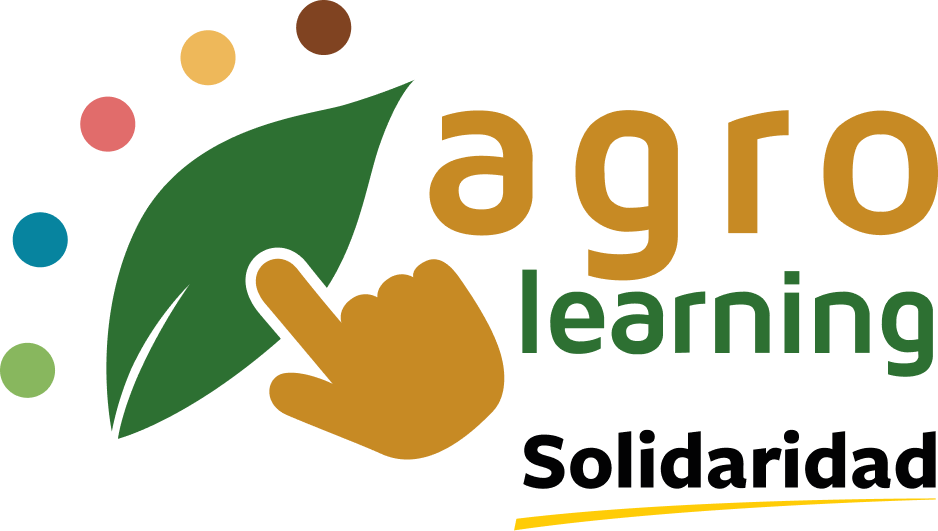POLICIES
PERSONAL DATA PROCESSING POLICIES
AGROLEARNING POLICIES
This policy applies to all databases and personal data contained therein, for whose treatment the FUNDACIÓN SOLIDARIDAD NETWORK COLOMBIA (hereinafter, the Foundation) is responsible within the contextual framework of Law 1581 of 2012 and the other regulations that govern it, add, modify, complement or regulate. For the purposes of this policy, the terms indicated below will have the following meanings:
Definitions:
*Authorization. Prior, express and informed consent of the owner to carry out the processing of personal data.
*Notice of Privacy. Verbal or written communication addressed to the owner of the personal information (user) through which the Data Controller (us) informs him or her about the existence of the information processing policies that will be applicable to him, the way to access them, and the purposes of the Treatment that is intended to be given to personal data. The privacy notice will be used only if the entity’s privacy policy cannot be made available to the owners.
*Database. Organized set of personal data that is subject to Processing.
*Personal Data. Any information linked or that can be associated with one or more specific or determinable natural persons (users). In order to comply with its legal and contractual obligations, the Controller (us) requires the processing of personal data, which includes those of its officials, clients, suppliers and third parties in general, to which the applicable regulations apply. provisions provided for by Law 1581 of 2012, its regulatory and complementary decrees, and consequently this policy.
*Public Personal Data. It is one that can be consulted by anyone directly, without the consent of the owner. Example: ID number, names and surnames, profession or trade, etc.
*Private Personal Data. Data that is only relevant to its owner. Example: residence address and telephone number.
*Semi-private Personal Data. It is one that, in addition to being of interest to the person, may interest the owner of a certain sector or group of people. Example: date and place of birth.
*Sensitive Personal Data. Data that affects the privacy of the owner or whose improper use may generate discrimination against him, such as that which reveals: racial or ethnic origin; political orientation; religious or philosophical convictions; membership in unions, social organizations, human rights organizations or organizations that promote the interests of any political party or that guarantee the rights and guarantees of opposition political parties; data related to health, sexual life; and biometric data.
*Treatment Manager. Natural or legal person, public or private, who, by themselves or in association with others, processes personal data on behalf of the Data Controller.
*Project or program. Any project or program that involves an information gathering activity by the organization and/or its allies.
*Responsible for the Treatment. Natural or legal person, public or private, who alone or in association with others, decides on the database and/or the processing of personal data.
*Owner of the information. Natural person whose personal data is the subject of Processing. (User).
*Treatment. Any operation or set of operations on personal data, such as collection, storage, use, circulation or deletion.
*Transfer. It occurs when the Controller, located in Colombia, sends personal information to a recipient, located inside or outside the country, and who in turn is Responsible for the Processing of said information.
*Transmission. It occurs when the Data Controller, located inside or outside the country, shares personal information for Treatment by the Data Processor located inside or outside the country.
- How do you obtain personal data?
The Foundation obtains your personal data in several ways. For example, when you access our website or our virtual classrooms. From there we can identify: your name, IP address, connection location and, sometimes, telephone number and email.
If you contacted us, your personal data may also be processed. By contacting our front office via email or phone, or by signing up for our email newsletter. In this case we process your email address, first and last names, contact number, etc.
We may also process your data that you share online with us, for example through our social networks. This allows us to offer you specific and relevant information, through advertisements and marketing activities.
- What personal data is collected?
As the Data Controller, FUNDACIÓN SOLIDARIDAD NETWORK COLOMBIA, in carrying out its activities, may collect personal information from:
*Officials
*Suppliers and contractors
*Representatives of allied companies
*Agricultural producers
Likewise, you may collect some data from the owners of the information, including:
Public data: Names, surnames, type of identification, marital status, age, sex, work experience, educational level, judicial and/or disciplinary records.
Semi-private data: Date and place of birth, location of the farm, hectares, type of crop.
Private data: Residence address, telephone number and email, family data, place and date of birth, signature, financial data, assets and economic activity.
Sensitive data: Organizations to which you belong, biometric data, etc.
Other data: Particular tastes and/or interests, interaction data (for example, cookies on our website that improve your user experience), among others.
From the previous list of personal data, the Foundation will only collect those that are considered necessary for the purposes for which they will be processed in each of its activities or projects/programs.
- Why do they collect personal data?
When requesting your authorization, the purposes of data processing are:
4.1. Educational and research processes
*Maintain contact with workshop and focus group attendees
*Maintain contact with virtual course participants
*Send information considered of interest to attendees and participants in educational and research processes
*Share it with allied companies or other members of Solidaridad Network inside and outside Colombian territory
*Control, historical and statistical purposes
4.2. Processes related to projects/programs
*Define reference indicators
*Validate behaviour of variables over time
*All objectives related to sustainable development
*Perform analysis and obtain statistics
*Share it with allied companies and Solidaridad Network organizations in a statistical manner
*Offer credit options
*Respond to requests, complaints and claims
*Respond to authorities’ requirements
*The Foundation treats your personal data confidentially. We ensure that appropriate technical and managerial measures are in place to protect your personal data.
- How long do you keep personal data?
The Foundation keeps the least amount of information possible and only stores the personal information collected for the time required to fulfill the purposes described in this Privacy Policy, in the authorization for data processing and/or to comply with our legal obligations. under applicable law.
If the data subject revokes their consent to use the information, the Foundation will retain the information in the event that a contractual relationship is maintained with the data subject and/or for the period of time required to comply with our legal obligations.
The owners may make requests, queries and/or claims regarding their personal data processed by the foundation through the following mechanisms:
*Sending email: agrolearning@solidaridadnetwork.org
*Directly at the offices located at Calle 79A #8 – 63 Piso 6, Bogotá, Colombia.
- Will you share personal data with third parties?
The Foundation never sells your personal data to third parties. However, you may share the information collected in accordance with the entity’s needs (i) with third parties for the provision of services to the foundation, including maintenance and development services for our applications; (ii) with our associated companies or affiliates; (iii) with other partners with whom the foundation shares activities or implements projects.
In addition, we may use IT systems of providers, in which the provider also has access to the system in which your personal data is processed.
In all cases, we ensure that these third parties comply with good guarantees in the field of privacy and security by entering into data processing agreements with them. A data processing agreement sets out how your privacy is protected.
If required or compelled by a court, administrative or arbitration order to transfer, transmit, share, share or disclose information to a governmental authority, only requested information will be provided and reasonable efforts will be made to prevent disclosure. unauthorized and/or transfer such information, as well as obtain confidential treatment of any undisclosed information in accordance with applicable law.
- What do we commit to when we collect your data?
The Foundation, as responsible for the Treatment, complies with the following obligations, without prejudice to the other provisions provided for in Law 1581 of 2012 and others that govern its activity:
7.1. We guarantee the Owner (you), at all times, the full and effective exercise of the right of habeas data.
7.2. We request and retain your data, under the conditions provided by law, a copy of the respective authorization granted by you in cases where it is necessary.
7.3. We inform the Owner (you) about the purpose of the collection and the rights granted to you by virtue of the authorization granted in cases where it is necessary.
7.4. We keep the information under the security conditions necessary to prevent its adulteration, loss, unauthorized or fraudulent consultation, use or access.
7.5. We guarantee to the Owner (you) that the information provided to the Data Processor is true, complete, accurate, updated, verifiable and understandable.
7.6. We update the information, promptly communicating to the Data Processor all the news regarding the data that you have previously provided and adopting the other necessary measures so that the information provided to it remains up to date.
7.7. We rectify the information when it is incorrect and communicate the pertinent information to the Data Processor.
7.8. We demand that the Data Processor at all times respect the security and privacy conditions of the Owner’s information.
7.9. We process queries and claims made in the terms indicated in the law.
7.10. We adopted an internal manual of policies and procedures to guarantee adequate compliance with the law and, especially, to respond to queries and complaints.
7.11. We inform the data protection authority when violations of security codes occur and there are risks in the administration of the Owners’ information.
7.12. We comply with the instructions and requirements issued by the Superintendence of Industry and Commerce.
- What are your rights as the owner of the information?
The Owner (you) of personal data has the following rights:
8.1. Know, update and rectify your personal data in front of the Controller. This right may be exercised against partial, inaccurate, incomplete, fragmented, misleading data, or those whose Processing is expressly prohibited or has not been authorized.
8.2. Request proof of the authorization granted to the Controller, except when expressly excepted as a requirement for the Treatment.
8.3. Be informed by the Controller, upon request, regarding the use that has been given to your personal data.
8.4. Submit complaints to the Superintendency of Industry and Commerce for violations of the provisions of the personal data protection law and other regulations that modify, add or complement it.
8.5. Revoke the authorization and/or request the deletion of the data when the processing does not respect constitutional and legal principles, rights and guarantees. The revocation and/or deletion will proceed only when the Superintendence of Industry and Commerce has determined that in the Processing of the information the Responsible Party has engaged in conduct contrary to the law and the Constitution.
8.6. Access, at least once a month free of charge, your personal data that has been processed by the Controller.
- Cookies policy
The Foundation uses cookies for its websites. A cookie is a small file embedded in the website pages that is sent to you through your browser and stored on your computer. Our website uses these cookies to make login more convenient.
Cookies will save your settings and preferences.
*You can disable cookies in your browser, but this may affect the functionality of the websites or access to the virtual classroom.
*You have the right to request a reVer, correction, or complete deletion of your information from our files. To do this, send a written request to the channel for handling requests, queries and complaints.
*In order to prevent abuse or fraud, we may ask you to properly identify yourself before taking action.
*If you are requesting a reVer of your information, you must send us a copy of the cookie in question. You can only delete cookie files from your computer yourself because they are stored on your local computer. Check your browser’s instructions before doing so.
*Cookies can never be used to access private information on your computer or to track passwords. They also cannot be used to infect a computer with a virus (Trojan horse). They are completely secure and have been an industry-wide standard for most websites in the world since the 1990s.
- Attention to Requests, Queries and Claims
The Foundation, through the communications area, will respond to all requests, queries, complaints and/or claims from the owners of the information, related to the rights established by law to know, update, rectify and delete their personal data.
10.1. Requests and queries
In accordance with article 14 of law 1581 of 2012, requests and queries will be responded to within a maximum term of ten (10) business days from the date of receipt.
*When it is not possible to attend to the query within said term, the interested party will be informed, expressing the reasons for the delay and indicating the date on which the query will be attended to, which in no case may exceed five (5) business days following the expiration of the first term.
10.2. Claims
In accordance with article 15 of Law 1581, when the Owner or his successors consider that the information contained in a database must be corrected, updated or deleted, or when they notice the alleged breach of any of the duties contained in law, may file a claim with the Data Controller or Data Processor.
The claim will be made through a written request addressed to the Data Controller or Data Processor, with the identification of the Owner, the description of the facts that give rise to the claim, the address, and accompanying the documents that you wish to assert.
*If the claim is incomplete, the interested party will be required within five (5) days of receipt of the claim to correct the deficiencies.
*After two (2) months from the date of the request, without the applicant presenting the required information, it will be understood that he has withdrawn the claim.
In the event that the person receiving the claim is not competent to resolve it, he or she will forward it to the appropriate party within a maximum period of five (5) business days and will inform the interested party of the situation.
Once the complete claim is received, a legend that says “claim in process” and the reason for it will be included in the database within a period of no more than five (5) business days. Said legend must be maintained until the claim is decided.
The maximum term to address the claim will be fifteen (15) business days counted from the day following the date of receipt. When it is not possible to address the claim within said term, the interested party will be informed of the reasons for the delay and the date on which their claim will be addressed, which in no case may exceed eight (8) business days following the expiration of the first term.
10.3. Channels for handling queries and complaints:
Sending email: agrolearning@solidaridadnetwork.org
Directly at the offices located at Calle 79A #8 – 63 Piso 6, Bogotá, Colombia
- Current regulations
This Information Processing Policy is governed by the provisions of Law 1581 of 2012, regulatory decree 1377 of 2013 and other regulations that modify them.
- Changes to the privacy policy
The Foundation reserves the right to reVer and/or modify this Information Processing Policy at any time. The Foundation will post any changes to this Policy on its website. When substantial modifications are made to this Policy, this fact will be communicated to the owners of the information and the date from which the new Policy will apply will be indicated.
- Validity
This policy comes into force as of January 2023. The personal data processed by the Foundation will remain in the Foundation’s databases until they fulfill the purpose for which they were collected.
- Applicable law and jurisdiction
This Privacy Policy will be governed and interpreted in accordance with the laws of Colombia, and any questions or disputes arising from it must be resolved by the courts of Colombia, Department of Cundinamarca, city of Bogotá.
Information processing
- Copyright and property rights
The Foundation is the owner of the intellectual property rights. Authorizes the full reproduction of texts, images, documents, multimedia content as long as its integrity is preserved and cited in accordance with the Creative Commons 4.0 License. Non-Commercial Recognition Without Derivative Works 4.0. International.
For questions about the reproduction of information, contact Solidaridad Network Colombia at: agrolearning@solidaridadnetwork.org.
- Inaccuracies
The Foundation would appreciate notification of any inaccuracies on its website or training platform.
*Please report any inaccuracies, broken links or suggestions for improvement by writing to: soporte@agrolearning.org
*Information and suggestions for improving the website or any notification that the Foundation receives will be considered non-confidential by the Foundation and intended to be used freely by the Foundation without the need for any additional consent.





